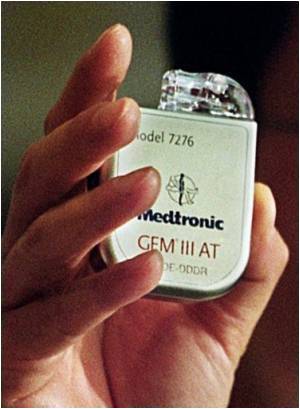In a recent study it was found that home monitoring system with daily telemetry in patients with ICDs is a safe procedure and decreases the number of inappropriate shocks.

"The information and communication technologies of e-health will radically change our healthcare systems over the next decade," said investigator Professor Salem Kacet from the Regional University Hospital of Lille, France. "This large multicentre trial aimed to demonstrate if a telemedicine system was as safe and efficient as conventional in-hospital monitoring and follow-up."
Long-distance implant telemetry allows the trend and event-triggered transmission of implant data and intra-cardiac ECG over distances of several metres, which are received by a patient device and subsequently transferred via a service centre to the physician on a password-secured internet site. Thus, the physician receives diagnostic information without the patient having to visit the physician.
The ECOST study followed-up a total of 433 patients for 27 months in 43 centres in France; patients were randomised to remote monitoring (active group) or in-clinic follow-up (control group). A first in-clinic ICD follow-up within 1-3 months after implantation was scheduled for all patients. Thereafter, patients in the active group were seen in the ambulatory department only once a year, unless an anomalous ICD function or event of clinical concern was reported by the remote monitoring system and required an additional in-clinic visit. In the control group patients were followed-up in the ambulatory department at six-month intervals.
Results showed according to the non-inferiority criteria of the trial that remote ICD monitoring is a safe alternative to conventional follow-up in terms of all cardiac and device-related major adverse events and all cause mortality. "These results are consistent with, and extend, previous findings by demonstrating the safety of long-term remote ICD monitoring," said Professor Kacet.
The ECOST trial was also the first to show a 52% reduction in the number of patients with inappropriate shocks and a 72% reduction in the risk of hospitalisations related to inappropriate shocks. In addition, results showed a 76% reduction in the risk of charged shocks, with a significant impact on ICD battery longevity. "This could have an interesting economic impact," said Professor Kacet, "by allowing ICD replacement at a later time." The effects of remote monitoring on the cost of health for ICD recipients will be evaluated in a forthcoming analysis.
Advertisement










